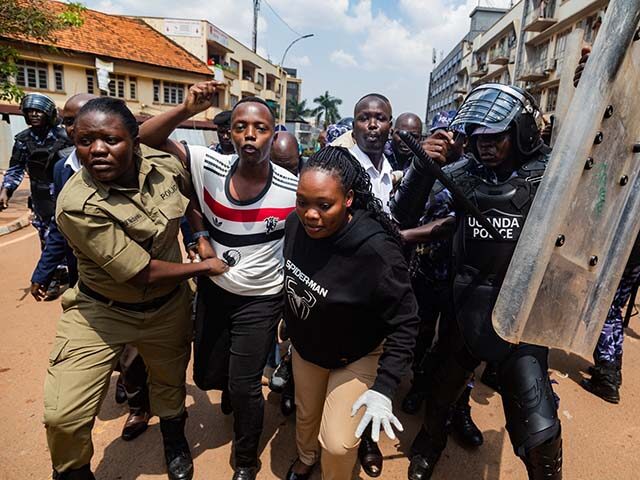Ugandan police arrested at least 42 young protesters and charged them with disorderly conduct on Tuesday after they gathered outside the parliament building in Kampala to demonstrate against government corruption.
“The protests are organized by Ugandans who hope to emulate efforts by people in neighboring Kenya, whose street action recently forced the president to dismiss almost his entire cabinet after widespread opposition to a contentious tax proposal,” Africa News reported.
Kenya’s massive protest movement began in response to President William Ruto’s plan to raise a plethora of taxes to reduce a growing budget deficit. As Africa News said, the Kenyan protesters were successful in scuttling the tax bill and forcing most of Ruto’s Cabinet to resign but they have not disbanded because they believe Ruto’s government is corrupt and they want the president himself to step down.
The Kenya protests have turned violent, a development blamed by leaders of the loosely-organized movement on “infiltrators” sent by the government to discredit them. The Kenyan government, in turn, says the protests were arranged by foreign powers to destabilize the country and overthrow Ruto.
A similar dynamic is at play in Uganda, where Marxist strongman President Yoweri Museveni – in power for almost four decades – said protests are “intolerable” and warned demonstrators they are “playing with fire.”
“What right… do you have to seek to generate chaotic behavior? … We are busy producing … cheap food, other people in other parts of the world are starving … you here want to disturb us. You are playing with fire because we cannot allow you to disturb us,” Museveni said in a rambling three-hour speech on Saturday. He previously denounced the demonstrators as “thieves and parasites.”
Museveni’s security forces said protests would be “anarchic” and warned “disorderly conduct” would not be tolerated. As in Kenya, young demonstrators took to social media to say they would ignore the ban and continue marching in the streets. Some of them posted photos online so they could be easily identified if Museveni’s troops decided to kill or abduct them.
“Tomorrow, very early in the morning, I will join my fellow young people as we march to parliament against escalating corruption in Uganda. We will come face to face with murderers and in case things go south for me, this is my official portrait,” one demonstrator wrote online before joining Tuesday’s march on Parliament.
Ugandan opposition leaders and civil rights lawyers said Museveni had no right to ban peaceful protests and blasted him for claiming the entire protest movement was a plot by opposition politicians to undermine his rule.
The police made dozens of arrests when the anti-corruption marchers reached Parliament on Tuesday. Human rights groups cried foul, insisting the demonstration was peaceful and the protesters did nothing to merit being arrested.
Many of the demonstrators used signs and chants to call for the resignation of House Speaker Anita Among, who has been accused of graft and sanctioned by the United States and United Kingdom.
Among, a senior member of the ruling National Resistance Movement (NRM) party, was accused of spending lavish sums of state money on foreign travel, and pocketing some money she took for trips that never actually happened. The anti-corruption movement says Among collected almost $900,000 in travel expenses in just six months last year, an outrageous amount for an impoverished nation with a massive budget shortfall.
Among and her husband were sanctioned by the U.S. State Department in May for “involvement in significant corruption tied to her leadership.” The Ugandan government is investigating whether she owns undeclared property in the United Kingdom.
The anti-corruption movement’s complaints are by no means limited to Among. Protesters claim their national treasury has been systematically looted, leaving no money for the government’s legitimate duties or important civic services.
“We are tired of corruption. Kampala is the pothole capital. It’s because of corruption,” one of the protesters said on Tuesday.
Human Rights Watch (HRW) said the arrests on Tuesday revealed Museveni’s “lack of respect for people’s right to protest and express themselves.”
“Instead of being arrested and blocked from protesting, those people should have been given a platform and listened to,” senior HRW Africa researcher Oryem Nyeko said.
In addition to arresting protesters on Tuesday, Ugandan police detained several members of parliament from the main opposition party, the National Unity Platform (NUP), on Monday night. NUP leader Bobi Wine described his party’s headquarters as being under siege by the police, and said some party members were “violently arrested” by the police.
Wine, a popular musician before entering politics, denied that his party organized the anti-corruption protests. He added that NUP supports “every effort to protest against injustice, corruption and misrule,” and he denounced the police as “cowards” for cracking down on protesters.

COMMENTS
Please let us know if you're having issues with commenting.